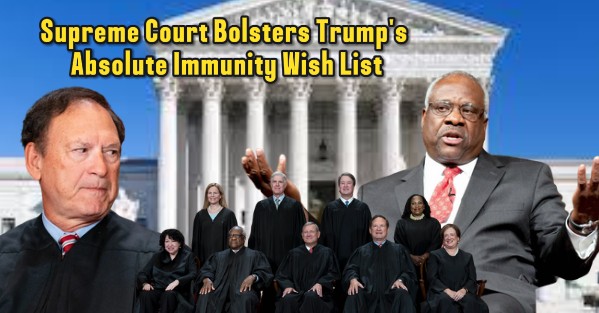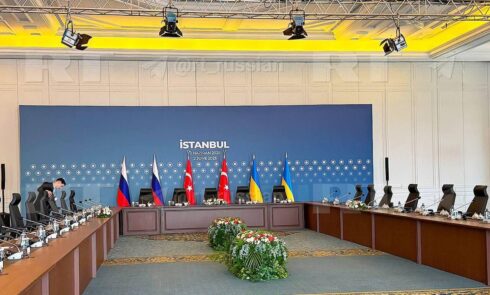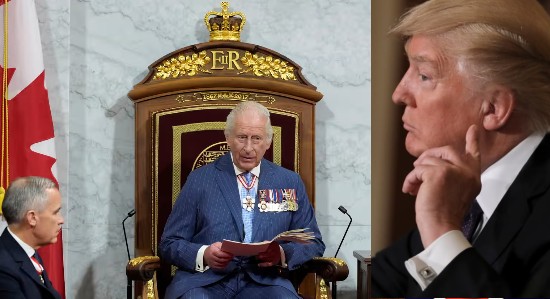The Supreme Court’s Ruling on Trump’s Absolute Immunity Request and Its Implications | OGM News – The United States Supreme Court has issued a heart wrenching and as usual, a 6-3 right-wing majority decision, ruling that former presidents are entitled to a degree of immunity from prosecution for actions taken during their tenure. Chief Justice John Roberts, authoring the majority opinion, stated, “We conclude under our constitutional structure of separated powers the nature of Presidential Power requires that a former president have some immunity from Criminal prosecution for official acts during his tenure in office.” This ruling specifically addresses immunity for official acts related to core constitutional powers, declaring that “this immunity must be absolute.”
This landmark decision could significantly impact the election subversion case against former President Donald Trump and set a critical precedent for future presidents. The Supreme Court has remanded the case to the district court, providing Judge Tanya Jackson with a new test to apply to the indictment. This decision that seemingly bolstered Trump’s Absolute Immunity wish list introduces complex legal considerations that could potentially jeopardize substantial portions of the case against Trump.
Legal Implications and Potential Challenges of Trump’s Absolute Immunity Ruling
The Trump legal team views this ruling as a major victory, and a green light for Trump’s Absolute Immunity claims, believing that charges related to official acts will be dismissed. Furthermore, they anticipate that key evidence required by Special Counsel Jack Smith to prove his case may now be inadmissible. This decision necessitates additional proceedings, briefings, and possibly more appeals, significantly complicating the prosecution’s efforts.
The ruling introduces a new paradigm for evaluating presidential actions, extending beyond the immediate case against Trump to future presidencies. It raises questions about the balance between presidential power and accountability, potentially altering the landscape of executive branch oversight. Legal experts and scholars are now tasked with interpreting the scope and limitations of this newly affirmed presidential immunity.
Political Reactions and Public Opinion
The Supreme Court’s decision has elicited strong reactions across the political spectrum. Critics, such as Ben Meiselas of the Meidas Touch Network, argue that the Supreme Court has effectively elevated the presidency to a position above the law, likening it to a monarchy. Aaron Rupar described the decision as “the biggest power grab in American history,” expressing concern about the concentration of power in the executive branch.

Conversely, supporters of the decision, including former President Trump, have celebrated the ruling on Trump’s Absolute Immunity. Trump took to social media, calling it “a big win for our Constitution for our democracy.” This polarized response reflects the deep political divisions in the country and highlights the ongoing debate about the proper balance of power in the U.S. government.
Expert Analysis and Future Implications of Trump’s Absolute Immunity
Legal experts are grappling with the far-reaching implications of this ruling that they think emboldens Trump’s Absolute Immunity. Elie Honig, a legal analyst for CNN, noted that while the principle that no person is above the law still stands, this decision requires a significant modification to that concept when it comes to the presidency. Honig stated, “We can no longer pretend that the president’s just any other person and shouldn’t be treated differently.”
The decision raises important questions about the future of presidential accountability and the potential for abuse of power. While some argue that this level of immunity is necessary for the effective functioning of the executive branch, others worry about the erosion of checks and balances. As the legal community and policymakers digest this ruling, there will likely be ongoing debates about potential legislative responses or constitutional amendments to address the concerns raised by this landmark decision.
The Ruling and Its Immediate Implications
The United States Supreme Court has issued a landmark decision, ruling that former President Donald Trump is entitled to some level of immunity from prosecution for actions taken during his presidency. This 6-3 ruling, authored by Chief Justice John Roberts, states that “Presidential Power requires that a former president have some immunity from Criminal prosecution for official acts during his tenure in office.” The decision has sent shockwaves through the legal and political communities, raising serious questions about presidential accountability and the balance of power in American democracy.
The ruling leaves room for interpretation, particularly regarding what constitutes an “official act” of the president. This ambiguity places a significant burden on prosecutors, including Special Counsel Jack Smith, to demonstrate that their cases against Trump involve actions that fall outside the scope of official presidential duties or were performed after he left office. The decision has effectively created a new legal landscape that must be navigated carefully by both prosecutors and defense teams in current and future cases involving former presidents
Dissenting Opinions and Public Reaction
Justice Sonia Sotomayor’s dissenting opinion has garnered significant attention, with her stark warning: “With fear for our democracy, I dissent.” This powerful statement from a Supreme Court Justice underscores the gravity of the decision and its potential long-term implications for American governance. Sotomayor’s dissent reflects a broader concern among legal scholars and citizens about the erosion of checks and balances in the U.S. political system.
The ruling on Trump’s Absolute Immunity request has elicited strong reactions from the public and political commentators. Many Americans express deep concern about the precedent set by this decision, fearing it may place presidents above the law and potentially encourage future abuses of power. The controversy surrounding the ruling has reignited debates about the importance of voter participation and the impact of Supreme Court appointments on the nation’s legal framework. A key question emerging from this decision is whether unconstitutional acts could now be considered “official acts” under this new interpretation of presidential immunity, further complicating the legal landscape and potentially shielding future presidents from accountability for a broader range of actions.














